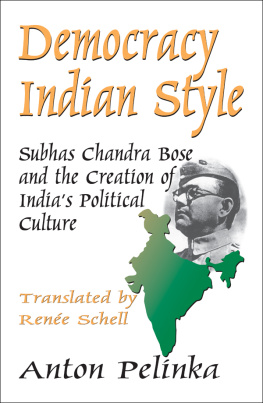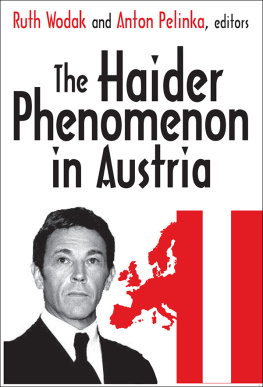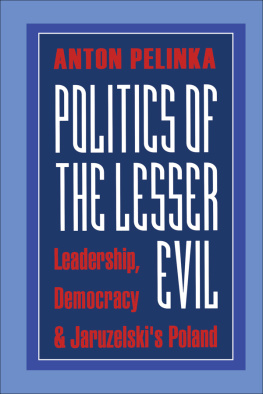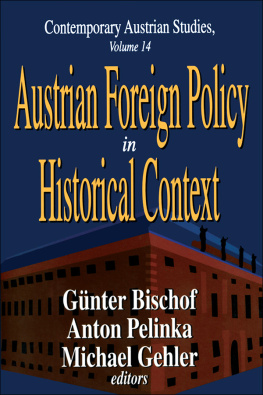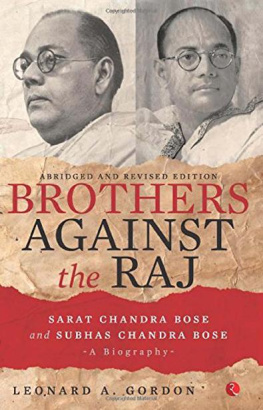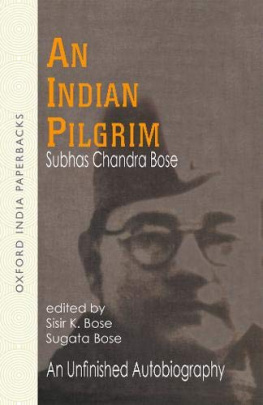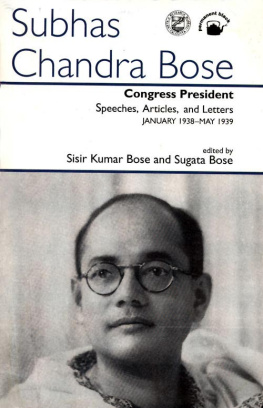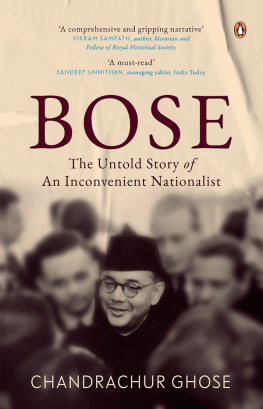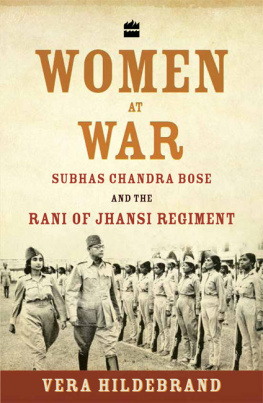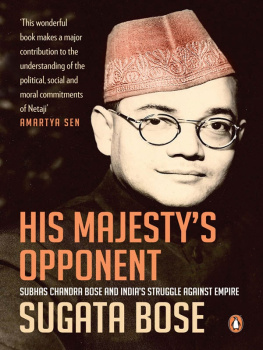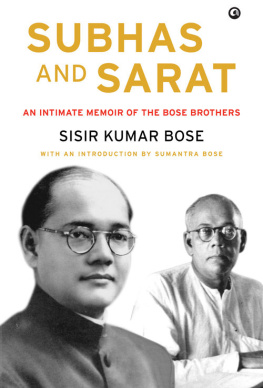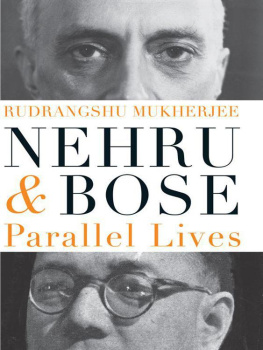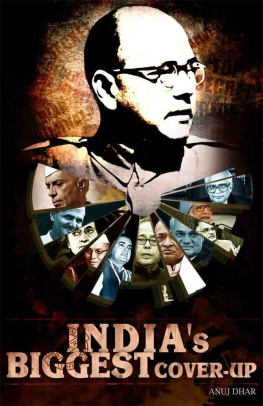Democracy
Indian Style
Democracy Indian Style
Subhas Chandra Bose and the Creation of Indias Political Culture
Translated by
Rene Schell
Anton Telinka
With a new preface by the author
First published 2003 by Transaction Publishers
Published 2017 by Routledge
2 Park Square, Milton Park, Abingdon, Oxon OX14 4RN
711 Third Avenue, New York, NY 10017, USA
Routledge is an imprint of the Taylor & Francis Group, an informa business
Copyright 2003 by Taylor & Francis.
All rights reserved. No part of this book may be reprinted or reproduced or utilised in any form or by any electronic, mechanical, or other means, now known or hereafter invented, including photocopying and recording, or in any information storage or retrieval system, without permission in writing from the publishers.
Notice:
Product or corporate names may be trademarks or registered trademarks, and are used only for identification and explanation without intent to infringe.
Library of Congress Catalog Number: 2002043002
Library of Congress Cataloging-in-Publication Data
Pelinka, Anton, 1941-
Democracy Indian Style: Subhas Chandra Bose and the creation of Indias political culture / Anton Pelinka ; translated by Rene Schell.
p. cm.
Includes bibliographical references and index.
ISBN 0-7658-0186-8 (cloth : alk. paper)
1. DemocracyIndia. 2. Political cultureIndia. 3. Bose, Subhas Chandra, 1897-1945. I. Title.
JQ281.P44 2003
320.954092dc21 |
2002043002
|
ISBN 13: 978-1-4128-5488-7 (pbk)
ISBN 13: 978-0-7658-0186-9 (hbk)
Contents
India is an example for democracys success. After this books first edition was published in 2003, Indian democracy still must be considered a success story. Three general elections2004, 2009, 2014demonstrated a democratic quality that is the envy of so many other countries: a very competitive but generally accepted process, despite the countrys huge social, ethnic, and religious fragmentations; an openness that makes peaceful government rotation working; the combination of an extremely diverse party system and, at the same time, the focus on clearly visible alternativesthe Indian National Congress (INC) and the Indian Peoples Party (BJP).
Indias economic growth enabled the country to increase its military power. India is one of the biggest buyers on the global armaments market. But India is still hesitant to play a more assertive role in international affairs. India is very much a society that looks first and foremost inward.
Indias political culture is defined by its inclusiveness. The consensus-oriented political system is based on permanent renegotiations of power-sharing compromises between the Union and the states. Governing coalitions reflect the diversity of religious, linguistic, social, and territorial interests. This tendency results in a lack of efficiency: Decision-making in India is a time-consuming affair with many veto holders to satisfy. This is the reason for the absence of a more decisive reform orientation. But this is also the reason for the very existence of Indian democracy.
Part of Indias inclusiveness is the tradition of embracing national heroes in a way that tends to border on worshipping. This, of course, includes Mahatma Gandhi, who understandably is seen as the father of modern India. In the second league of national heroes, Subhas Chandra Boses status is broadly accepted. In recent years, his hero status has grown. Bose statues can be found all over India. He belongs more than ever to Indias political pantheontogether with Mahatma Gandhi, Pandit Nehru, and Indira Gandhi.
Hero-worshipping always lacks balance. Among the recent publications concerning Boses life and politics, the most remarkable is the book his grandnephew, Sugata Bose, published in 2012: His Majestys Opponent. Subhas Chandra Bose and Indias Struggle against Empire (Allen Lane, PenguinNew Delhi). This book is an example that an academically sound book can become one-sided. Sugata Bose plays down or even neglects some aspects of his granduncles less attractive political dalliances. Subhas Chandra Bose not only used Nazi Germany (mostly unsuccessful) and Japan (quite successfully) as allies against the British Empire. He also published articles and made speeches praising Hitlers National Socialism; and justified Japans extremely cruel occupation of Chinese (and other Asian) territories.
Subhas Chandra Boses political role is much more complex than the role usually associated with a national hero. Boses role must be seen in a dialectical way, which is the approach I tried to demonstrate in this books first edition, published 2003. And Boses ambivalence concerning democracy is still needs to be underlined in 2014.
Democracy Indian Style is a combination of chapters about Subhas Chandra Boses dramatic life, and chapters trying to characterize Indias political system and political culture from the perspective of the early twenty-first century.
Anton Pelinka
Professor of Nationalism Studies and Political Science
Central European University, Budapest
May 2014
The initial idea to learn more about Subhas Chandra Bose came to me during my first stay in India in 1977. I met an Indian Sikhat the Austrian Embassy in New Delhi. He told me that he had been to Innsbruck, Austria in 1943. His was the story of a POW from the British Indian Army who was recruited by Bose to recruit other POWs for Boses Indian Legion. Innsbruck was an interesting place for such an activity because the trains with the Allied soldiers who became prisoners of Nazi Germany during the battles in North Africa usually passed through there.
Later, I became familiar with Boses activities in Austria and I realized that his years there had been much underrated by his previous biographers. But Boses link to Austria is just one of the motifs responsible for my interest in Boses impact on contemporary India. Teaching comparative politics and democratic theory in Austrian and U.S. universities made me sensitive to the extraordinary success of democracy in Indiadespite all the presumptions that a stable (and liberal) democracy needs a certain economic environment that a county like India cannot provide.
I am especially indebted to certain institutions that were instrumental for my research: The Hoover Institution at Stanford University, the National Archives in Washington, D.C., and the Austrian State Archives (Oesterreichisches Staatsarchiv) in Vienna. I am especially grateful for the friendly welcome I was able to enjoy during my stay in Calcutta in 1999. The late Sisir Kumar Bose, Subhas Chandra Boses nephew, was a gracious host during the days of my visit to the Netaji Research Bureau.
After extensive research, I was able to use my sabbatical at the University of Michigan, Ann Arbor for writing and finalizing this manuscript in 2001 and 2002. The friendly atmosphere on UMichs campus plus the interest shown by Ashutosh Varshney, the director of UMichs Center for South Asian Studies, was very helpful during my stay in Ann Arbor.
All the uneven chapters follow Subhas Chandra Boses life. All the even chapters describe and analyse Indian politics and society.
I wrote this manuscript in German. Rene Schell was a perfect translator with whom to cooperate and was a professional joy. As always, I am indebted to Ellen Palli, who was important in giving the manuscript the perfect touch. And, last but not least: I thank Mary E. Curtis and Irving Louis Horowitz from Transaction Publishers for accepting this book.


